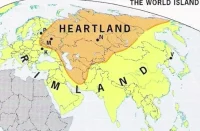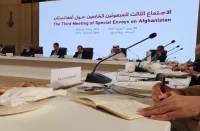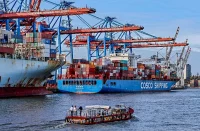Konstantin PENZEV (Russia)
Not long ago, I was talking with a very smart friend who knows a lot about Russian history. As usual, the conversation turned to politics. It turned out that my friend has some pretty liberal opinions, but some of the ideas he expressed told me that he watches television anyway.
“No matter what anybody says, the Soviet Union started falling apart after the war in Afghanistan,” he said.
“Maybe,” I said, “but what does that have to do with our young men who served there? Do you really believe in all that talk about international duty?”
“Just a minute,” he said, raising his hand to stop me from interrupting. “What does international duty have to do with it? The Americans wanted to put military bases, missiles and aircraft in Afghanistan, and there is such a thing as estimated flight time and all that…”
“So? Did they do it?”
“What do you mean?”
“What I mean is, after Gorbachev pulled the troops out the place didn’t stay empty for long. If memory serves, there are 70,000 American soldiers in Afghanistan now, and soon there’ll be 100,000 —just as many as we had. Right? Right. But why did they go there, out of some sense of international duty? Maybe Obama wants to establish democracy and open a line of fast food restaurants. All I want to know is, what have they put in Afghanistan? What kind of missiles and long-range bombers, and when will the United States begin bombing us?”
My friend looked thoughtful, and then he decided to let me talk.
“Okay, what are the Americans doing in Afghanistan then?
“No, try to answer the question, and just ask yourself —what does that country have to offer besides its geographic location? Oil, gas, uranium, rivers of milk and honey? What’s there?”
There came a short pause while my friend thought about what kind of raw materials Afghanistan has. Finally, somewhat uncertainly, he answered:
“Opium?”
To tell the truth, I have no idea why the Soviet Union sent troops to Afghanistan. I never sat in the Politburo and talked about life with Yuri Andropov. I don’t know if Brezhnev’s Politburo wanted to earn a little money from the heroin trade, or if, on the contrary, they wanted to eliminate a source of infection near Soviet borders. In my scatterbrained socialist youth, drug addicts in the Primorsky Krai (where I grew up) only flipped over drugs that were grown and made locally. There was no heroin in Primorye. Now there is; it’s imported and sold at a very reasonable price.
I doubt that the Soviet troops in Afghanistan were a preliminary step in Russia’s expansion towards India. That’s what the British Empire feared more than anything in the 19th century. Russia’s aspirations towards Central Asia gave London nightmares about Russian battalions taking Delhi and Bombay by storm. Then more recently, the world’s leading military powers started abandoning the practice of classical colonialism. It often cost more to maintain expeditionary forces than to simply bribe a few native ruling tribes.
Why did the United States jump through hoops in the 1980s to drive the Soviet Union from that impoverished country using a savage and illiterate people? Could the Soviet Union have carried out extensive mining during its ten years that covered the costs of maintaining 100,000 soldiers armed with heavy weapons and turned a hefty profit? Could the United States, which now has its forces in Afghanistan, have started producing oil and building powerful electric power stations? Why is Obama willing now to negotiate even with the sinister anti-Semite Ahmadinejad and all the devils of Central Asia, both individually and collectively, to acquire unimpeded access to the country?
I’ll concede that Afghanistan has extensive reserves of certain kinds of resources. Consider, for example, the copper ore deposits in the Aynak Valley. I should mention that it is currently the largest undeveloped copper deposit in the world. It was first discovered by Soviet geologists in 1974, and during the 1980s the USSR carried out preparatory work there. But it folded when Soviet forces left. So it can be argued that the USSR actually had economic interests in Afghanistan, and those interests were tied to its mineral resources.
After the Soviet troops were withdrawn, Aynak was forgotten as though it had never existed; then in 1998 we learned from representatives of the Taliban that the Siemens Corporation had become interested in it. However, the company’s interest came to nothing, and Aynak was again forgotten until the Taliban lost control in 2001. The story of how they lost control of the country is a different subject, but I’ll try to describe it briefly.
As you, dear reader, are probably aware, in 2001 two skyscrapers were blown up in New York City. Who blew them up is unknown. US President George Bush claimed that former CIA agent Osama Bin Laden did it. Some investigators agree in principle that Mr. Osama committed that heinous act, but they are unsure whether he is in fact a former agent of the CIA. In short, several members of the media argue that the terrorist act of September 11, 2001 was the result of collusion among some people associated with the ruling faction in the United States.
On October 7, 2001, the Armed Forces of the Empire of Good began a military operation against Mr. Osama under the code name Operation Enduring Freedom in which B-1, B-2 and B-52 bombers, naval forces, and the Marines took part. Since CIA agent Osama bin Laden (he started working with the CIA while he was a mujahedeen) was living in Afghanistan, the operation against him was naturally conducted in that country. The Taliban government was overthrown and the country was occupied. They failed to find Mr. Osama, of course; and now he is either still living in Afghanistan, or he’s in Pakistan, or he has died from typhus. However, I wouldn’t be surprised if in 20 years we find out that after Obama became President he shaved off his beard and moved to Oklahoma.
Back to the Aynak copper deposit. I should mention that after the occupation regime in Afghanistan was established, local authorities turned their attention to the country’s mineral resources. In 2003, experts of the British Geological Service and the US Geological Survey conducted a geophysical survey of the Aynak deposit with Pentagon support and confirmed the conclusions of Soviet geologists about the rich copper ore deposits there. And what happened?
In August 2006, Afghanistan’s Ministry of Mines invited international investors to bid on development of the Aynak field. The bidders included the Australian consortium Bahar, the Indian Corporation Hindalco Industries, Canada’s Hunter Dickinson, the Kazakh company Kazakhmys (which is registered in Great Britain), two Chinese companies- —Zijin Mining and China Metallurgical Group Corporation (MCC) — and America’s Phelps Dodge, as well as two Russian organizations: Tyazhpromexport and Soyuzmetallresurs.
MCC won the competition.
It’s funny that now we frequently hear US concerns about China gaining power. That gives rise to a reasonable question. Why didn’t at least the Australian corporation win the competition? Probably because the US government couldn’t care less about some ridiculous copper ore deposit. Why not? Could it be that such undertakings don’t pay enough to make the US establishment want to get involved?
The classical reason for war in our time is oil. Is there any in Afghanistan? Yes. Less than is needed to justify a small victorious war, but there is some. However, long-range global strategic plans may be involved.
John Foster, a columnist for Canada’s The Chronicle Herald, wrote a piece on August 26, 2009 called “Why is Afghanistan So Important?” One glance at a map and a little knowledge of the realities of the region tell us all we need to know: the military intervention by Western countries in fact has deep roots. Afghanistan neighbors on Middle Eastern countries that have large reserves of oil and natural gas. Although there is little oil in Afghanistan itself, two of the countries bordering it have the world’s second and third largest reserves of natural gas —Iran and Turkmenistan.
It simply turns out that Uncle Sam has a strategic plan to link the oil and gas deposits of South and Central Asia by a pipeline so that “energy can flow to the south.” Perhaps that is why Washington first threatened Iran, and then after Obama took office he began to put out feelers in Tehran with the idea of gaining unimpeded access to Afghanistan. It is also possible that implementation of this strategic plan is the reason for the Manas Airbase in Kyrgyzstan; it has provided exactly that access (it has now been redesignated a Transit Shipment Center).
As we know, it doesn’t cost much to make plans. As for the current reality, that’s the way things are. The Taliban’s main source of funding was trade in raw opium and the heroin derived from it. In 1999, 4565 tonnes of raw opium were produced in Afghanistan; the total world production that year was 5778 tonnes. Thus, Afghanistan is the largest producer of heroin and has a virtual monopoly over production of the raw material for its manufacture. Not to mention that this country is currently the largest producer of hashish after Morocco.
The military operations in 2001 caused a drop in raw opium production, but since then it has continually increased. According to the International Committee for Drug Control, raw opium production in Afghanistan during 2002 amounted to 2700 tonnes; in 2003 it was 3400 tonnes; in 2004 —4200 tonnes; in 2007 —8200 tonnes; and in 2008 —7700 tonnes. It’s difficult to say how much is actually produced, as opposed to what the ICDC statistics say.
We know that the amount of opium poppy under cultivation in Afghanistan during 2007 had increased by more than 2.5 times compared with 2002 and is estimated at 19.3 thousand km². In Afghanistan raw opium costs about $100 per kilogram. Thus, the 7700-tonne harvest is worth $770 million on its primary market, and that is just a drop in the bucket. After it has been processed and resold, its value increases many hundreds of times, breaking all imaginable records for return on investment. The profitability of this “business” is comparable only to that of printing money (it costs eleven cents to print a $100 bill). For example, a gram of heroin costs $100 on the Ukrainian black market (2009).
Those are the facts.
Konstantin Penzev is a writer, a historian and a columnist for New Eastern Outlook.
Source: New Eastern Outlook














Pingback: Narco Atlantic Treaty Organization (II) | Oriental Review
The US now has 94,000 troops in Afghanistan which is more than the 92,000 in Iraq. US has declared plans to draw down another 50,000 from Iraq and move them to Afghanistan. That will bring the tally to nearly 140,000. Together with Europen, Australian and Canadian trrops, the total N(arc)ATO force will be nearly 200,000 by Sept 2010. Also NATO is training/ trained 100,000 Afghans. What is the need for 300,000 troops? If anyone has not guessed it, the answer is Pakistan is the first target followed by Iran. NATO/ Zionists want to balkanize Pakistan, seperate Balochistan with 750 kms of coastline. Yes, Penzev is right on all accounts that oil and gas is what the west is after.
Once the western goal of securing Middle East/ FSU energy is accomplished, China will become isolated and either be drawn into the west or there could be a major war. Does China know about this game plan? I’d reckon yes.
Hi there! This is my first comment here so I just wanted to give a quick shout out and say I really enjoy reading your articles. Can you recommend any other blogs/websites/forums that go over the same subjects? Many thanks!